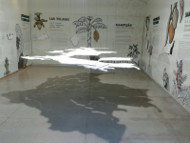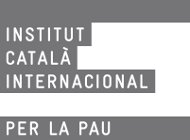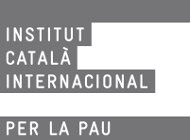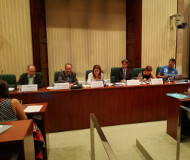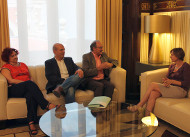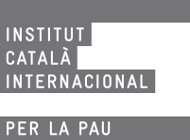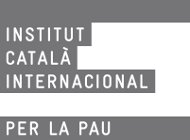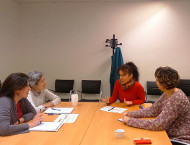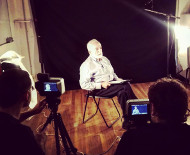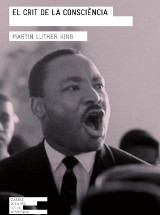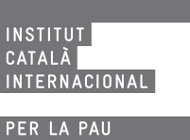This week, ICIP Director, Mrs. Tica Font, and two representatives of the Training and Dissemination area, Elena Grau and Sabina Puig, are taking part on several workshops and seminars organized by the Medellin Museo Casa de la Memoria. During their stay, they will be presented several proposes such as the Museum’s exhibition design approach and the pedagogical materials it produces. The visit will also allow ICIP representatives to get to know the work the Museum carries out in cooperation with other institutions, such as the Unidad de Victimas (Victims Unit).
This visit is framed within a project of experience exchange that ICIP and the Museo Casa de la Memoria are carrying out in 2016, which counts with the support of the Barcelona City Council.
Author: whads
Job opening
ICIP has published the job announcement for the position of Head of Economics, Finance and Human Resource Management. Those interested, who meet the profile requirements, can send the required documents to icip@gencat.cat within fifteen calendar days of the publication date of this announcement.
Changes in ICIP’s Board of Governors
The Government of the Generalitat, at the proposal of the Minister of Foreign Affairs, Institutional Relations and Transparency, has appointed Manel Vila Motlló, current General Director of Development Cooperation, and Carme Garcia Suárez, General Director of Institutional and Parliamentary Relations, as members of ICIP’s Board of Governors. They will be replacing Marta Macías Quesada, Director of the Catalan Agency for Development Cooperation, and Miquel Puig Roig, former General Director of Institutional and Parliamentary Relations.
ICIP’s Board of Governors appreciates the work done by the two outgoing members and congratulates both incoming members on joining the highest governing body of the International Catalan Institute for Peace.
ICIP’s Board of Governors consists of three members appointed by the Government of the Generalitat and seven members elected by the Parliament of Catalonia. Currently, however, there are only five members selected by Parliament, not seven, due to the death of Alfons Banda and the election of Josep Maria Terricabras as Member of the European Parliament, a position that is incompatible with membership of ICIP’s Board.
ICIP President appears before Parliament
The current president of the International Catalan Institute for Peace (ICIP), Xavier Masllorens, and the ex-president of the institution, Rafael Grasa, appeared this afternoon before the Commission on Foreign Affairs and Cooperation, Institutional Relations and Transparency of the Parliament of Catalonia to present the future challenges facing the Institute and the 2015 Activity Report, respectively.
The current president, Xavier Masllorens, defined the present stage of ICIP as “a time for reflection and consolidation” and listed the five main challenges set by the new Governing Board, which was renewed in May in compliance with the law by which the institution was created: “to focus on priorities and actions; to promote our international dimension in order to preserve our earned prestige; to strengthen our territorial dimension; to become a benchmark in specific areas; and to streamline internal procedures.” Masllorens also pointed out the need for ICIP “to serve the country, parliamentary groups, and similar organizations and institutions working in the field of peace,” and added that “we must have a voice, create our own opinions, and educate.”
The ex-president of ICIP, Rafael Grasa, then presented the achievements of his last year in office, contained in the 2015 Activity Report, and specifically highlighted the research programs, increased territorial presence, the adoption of the new Multi-Year Plan 2015-2018, the consolidation of the ICIP Peace in Progress Award, and the activity carried out in Colombia as part of the peacebuilding process. As for pending issues, Grasa demanded more autonomy for the institution, the restoration of doctoral scholarships and the need for a new space for the ICIP Library, a reference center in the field of peace, conflicts and human rights, with more than 7,000 volumes. In closing, Grasa acknowledged the support received during the eight years of his presidency and described the creation of ICIP as prestigious.
All of the parliamentary groups acknowledged the work done by the previous president and expressed their willingness to cooperate with the new ICIP Governing Board.
The President of Parliament meets with the new ICIP Governing Board
On Wednesday, September 21 (the International Day of Peace) the President of the Parliament of Catalonia, Carme Forcadell, met with a delegation from the new ICIP Governing Board to learn about the challenges facing the institution during this stage with a renewed presidency.
The delegation was led by ICIP’s new president, Xavier Masllorens, and also included David Minoves, a representative of ICIP’s Governing Board, and Tica Font, director of the institution.
New Call for R-ICIP Research Grants
The International Catalan Institute for Peace (ICIP) has launched a new call for grants to fund peace research projects (R-ICIP 2016-2017) for a total amount of 40 000 euros.
The grants, managed by the Agency for Management of University and Research Grants (AGAUR) are aimed at research groups from universities in the Catalan university system, or public and private non-profit centers of Catalonia that include research as one of their main activities. Grant applications can be submitted until 23 November
Peace Brigades International, ICIP Peace in Progress Award 2016
The 2016 ICIP Peace in Progress Award recognizes the non-governmental organization Peace Brigades International (PBI) “for its long history of protecting human rights defenders who work in areas of repression and conflict”.
Peace Brigades International was created in 1981 by a group of activists inspired by Gandhi’s nonviolent tactics. They were convinced that international accompaniment could deter attacks against the civilian population in conflict areas. Over the last 35 years, the organization has developed activities to support local human rights defenders, including protection and accompaniment, safety training, advocacy workshops and workshops on rebuilding social fabric.
The award ceremony took place on Tuesday, February 7, at the Parliament of Catalonia. On the part of the award-winning organization, the representative of PBI Spain, Montserrat García, picked up the award, while the commentary was given by the historic human rights activist and current Member of Congress in Guatemala, Nineth Montenegro.
The ICIP Peace in Progress Award is granted by agreement of the Governing Board of ICIP and consists of public recognition, a sculpture created by the Nobel Peace Prize winner, artist and activist Adolfo Pérez Esquivel, called Porta del Sol, and a financial prize of 4,000 euros. The award is presented at an institutional award ceremony which takes place annually at the Catalan Parliament.
ICIP launches a creation process for a new exhibition
ICIP has launched a creation process for a new art intervention to consolidate its line of street exhibitions. This project aims to commission the design of a new outreach tool that uses reflection, as well as art and creativity, to challenge the public and raise awareness about questions related to ICIP’s line of work.
Specifically, ICIP would like to receive ideas that revolve around these issues: the role of civil society in peacebuilding; examples of nonviolent struggle for social transformation; peacebuilding at the municipal level; actual experiences of peaceful coexistence; the role of young people in building peace. Exhibitions produced in recent years following this same line of action can be found on the ICIP website. They are productions which can easily be installed in the street, attract the attention of passersby, and can easily be moved from one municipality to another.
ICIP will study the ideas received over the coming weeks. he most highly regarded proposal should be developed over the coming months, upon the signing of a contract for the commission of the work between ICIP and the awardee.
Individuals, companies or organizations interested in submitting proposals should contact ICIP (spuig.icip@gencat.cat) for more information about requirements, timeline and budget allotted for this new project. The deadline for submitting proposals is Monday, May 2, 2016.
ICIP collaborating with the Colombian Film Festival of Barcelona
ICIP and the Taula Catalana per la Pau i els Drets Humans a Colòmbia (Catalan Coordination Group for Peace and Human Rights in Colombia) are convening the Official Documentary Section of the Colombian Film Festival of Barcelona: The Diaspora, which will take place October 13-23 at different venues in Barcelona. The festival, which this year will celebrate its thirteenth edition, is organized by cultural producer Imago Gestiona.
For the first time, these three entities – Imago Gestiona, Taula per Colòmbia and ICIP – are jointly convening the Official Documentary Section of the 13th Colombian Film Festival of Barcelona.
From the very beginning, the Documentary Section has always played a special role in the celebration of the festival. The documentary is a genre which, through its language, makes it possible to approach different human realities and therefore to approach and communicate to the world the reality of a country like Colombia. The deadline to register for the documentary section is April 16, 2016.
ICIP recovers the memory of the catalan peace movement
In order to trace the history of the peace movement in Catalonia and safeguard its documentary fund, ICIP is recording oral interviews with various protagonists of the collective action for peace. In this first stage of the project, interviews have been conducted with the activists Lluís Fenollosa and Jordi Maluquer; the first conscientious objector in Spain, Pepe Beunza; Capuchin friar Joan Botam; Professor Jaume Botey; priest and writer Josep Dalmau; and the promoter of the group Amics de l’Arca and a pioneer of the principles of nonviolence in Catalonia, Fèlix Saltor.
This project of oral memory is being carried out in collaboration with the audiovisual production company Metromuster. The interviews are being conducted by Xavier Garí, a specialist in the political and social history of the Peace Movement in Catalonia, and they will be published on video and at the disposal of researchers and historians in 2017.
“The Trumpet of Conscience,” by Martin Luther King
El crit de la consciència (“The Trumpet of Conscience”) features the lectures that Martin Luther King delivered in November and December 1967 – a few months before his assassination – for the Canadian Broadcasting Corporation. The CBC had explicitly asked him to speak about the issues he considered most important, not for blacks, nor for the United States, but for the world at large. The book reveals some of King’s most introspective reflections and his last impressions of the movement he himself had inspired. They are, in a sense, a synthesis of his thought and could be considered to be his testament.
Thus he talks about issues that have been concerning him over the last few months: the need to transform nonviolent protests into mass civil disobedience; the conviction that it was necessary to resist participation in the Vietnam War, and that committed youth should play a decisive role in the creation of a new world, or the need to pursue his dream of universal peace.
Through the five lectures, corresponding to the five chapters of the book, King highlights a different aspect of the civil rights struggle in the United States. In his first talk, “Impasse in Race Relations,” he explains his concern for the unlikelihood of social equality in the United States and proposes civil disobedience as a constructive force. The second lecture, “Conscience and the Vietnam War,” focuses on opposition to the war. “Youth and Social Action,” King’s third lecture, envisions the power of a united youth front and the strength of their activism for social change. In the fourth chapter, “Nonviolence and Social Change,” King defends nonviolence as the best tool to convince the wielders of power to respond to poverty. Finally, King’s concluding speech was a live broadcast of his 1967 Christmas Eve sermon at Ebenezer Baptist Church.
The book, published by ICIP and Angle Editorial in the “Classics of peace and nonviolence” series, is a re-edition of Terenci Moix’s 1968 translation of “The Trumpet of Conscience,” published in 1967. This new edition features an introduction by Vicent Martínez Guzmán, PhD in Philosophy and honorary director of the UNESCO Chair of Philosophy for Peace, and includes the epilogue written by Josep Maria Ainaud de Lasarte for the 1968 edition.
The author
Martin Luther King was born on January 15, 1929 in Atlanta, Georgia, the son and grandson of pastors of Ebenezer Baptist Church. From an early age he became aware of the situation of social and racial segregation in which black citizens of his country lived, especially in the southern states. After becoming a Baptist pastor, he took over the church in Montgomery, Alabama, in 1954. Starting in 1955, he led the struggle of black Americans to achieve equal rights with whites.
His nonviolent action, inspired by Gandhi, mobilized more and more citizens, culminating in the historic March on Washington in the summer of 1963, with the participation of 250,000 demonstrators. That is when King delivered the most famous and moving of his splendid speeches: I Have a Dream. In 1964 he was awarded the Nobel Peace Prize, four years before he was assassinated in Memphis on April 4, 1968.
New Call for Proposals for Grants Aimed at Entities
The International Catalan Institute for Peace (ICIP) has issued a new call for proposals for grants aimed at non-profit entities, foundations and cooperatives domiciled in Catalonia for participation in research network projects that promote peace. The maximum amount available for this call for proposals is 40 000 euros.
The deadline for submitting proposals is 15 December 2016.

